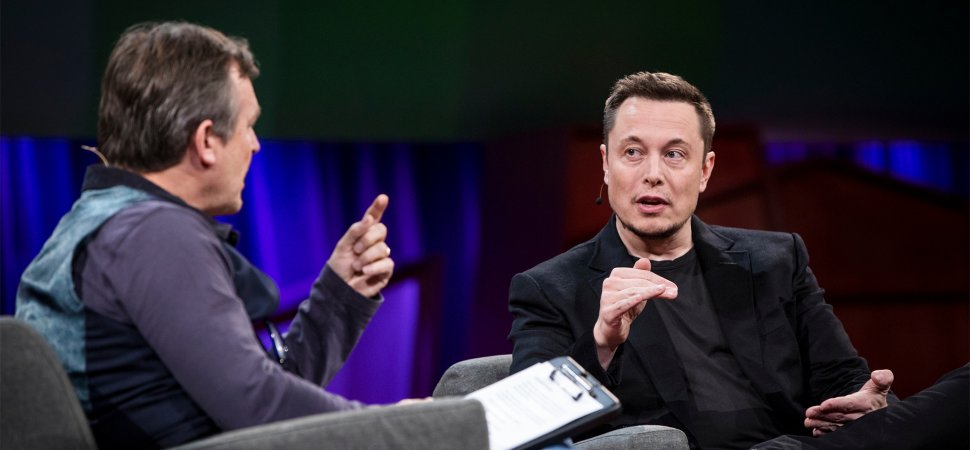Elon Musk Knows Something About Inspiration That Every Leader Should Take to Heart
We all need our "Mars Shots."

By Tim Leberecht
At the recent TED Conference in Vancouver, visionary and entrepreneur extraordinaire Elon Musk, founder and CEO of Tesla, SpaceX, and most recently The Boring Company, was interviewed by TED curator Chris Anderson. Although it was a fairly friendly interview, at one point Anderson pressed Musk on the criticism he’s received regarding his vision for colonizing Mars:
Was it not escapist, luxuriously unnecessary, and even outright ludicrous to shoot for Mars when we have so many pressing problems here on earth that could hugely benefit from Musk’s talent and attention?
Musk’s reply was remarkable. As he often does, he paused, seeming to mentally tone down his inner geek before responding. Then he said:
“I’m not trying to be anyone’s savior. I’m just trying to think about the future and not be sad.”
He continued: “I just think there have to be reasons that you get up in the morning and you want to live. Like, why do you want to live? What’s the point? What inspires you?” And he concluded: “The value of inspiration is very much underrated.”
That struck a chord with me, one which reverberated a few weeks later at an Impact Hub conference in Berlin. There, I got to know a social entrepreneur from Canada who lamented our obsession with “solving problems”: “What are we going to do when we’ve solved them all?”
Indeed. We consistently tend toward what Evgeny Morozov once labeled “solutionism,” an engineering mindset that applies an engineering framework as the hammer for all nails. We become fixated on fixing when dreaming might get us further. As a result, inspiration often gets dismissed as soft, fuzzy, and nice to have. But it is arguably the most important capacity of any innovative business.
If you fail to inspire, your business won’t thrive, regardless of whatever’s happening in the external environment. Inspiration is the engine behind intrinsic motivation, which is positively correlated to productivity. It is the spark that allows for meaningful differentiation, innovation, and customer and employee loyalty. Inspiration is the reason your employees keep coming to work, and it is why, as Elon Musk cheekily bragged at TED, BMW shows their teams pictures of him “to motivate their employees.”
Inspiration is a prerequisite for meaningful business and critical for organizational success. So what can you do to become a more inspirational leader?
Dream big
Never let go of the boldest version of yourself, your organization, and your brand. It might not always seem possible, or even be realistic, but it gives you and your employees something to strive for.
Tell a story
As venture capitalist Ben Horowitz put it, “Your company story is your company strategy.” Formulate your story, with a compelling protagonist, enough adversity and drama, various twists, and a greater, universal truth that everyone can relate to. Tell it at every possible occasion and use each time as an opportunity to refine. Only by doing so will your story evolve into a powerful narrative that others are compelled to be part of.
Build community
Leaders are conveners. For us social animals nothing is more inspiring than face-to-face connection and the feeling of being part of something greater than ourselves. An inspired organization is not unlike a tribe with its own secret rituals, shared values, and collective identity that informs its members’ understanding of themselves.
Be vulnerable
Inspiration is a bit like falling in love–with an idea, a concept, or a person. Your heart is overflowing, and you want to tell the whole world about it. The ability to fall in love, however, requires that one yield to imperfection and embrace vulnerability. We don’t fall in love with something or someone perfect. This is why a leader who is never wrong and never fails will be respected but never loved. A leader who is always strong is not authentic. It is in moments of adversity and weakness when not only character shows but heart.
As Chris Anderson tells in his book, Elon Musk won his staff over after the third failed launch of his SpaceX Falcon 1 rocket in 2008. Morale had hit rock bottom when he gathered his employees. Visibly moved, Musk told them, “I can assure you I will never, ever give up.” With these words he converted his colleagues into followers, and turned a project into a movement.
Commitment matters, and convictions, too. Musk is a romantic, but that doesn’t mean that he doesn’t care about pressing global issues, as demonstrated by his prompt resignation from Trump’s economic council after the U.S. President backed out of the Paris Climate Change Agreement.
Actions do not speak louder than words, but they make the right words even more inspiring.
Originally published on Inc.com.
Photo credit: TED